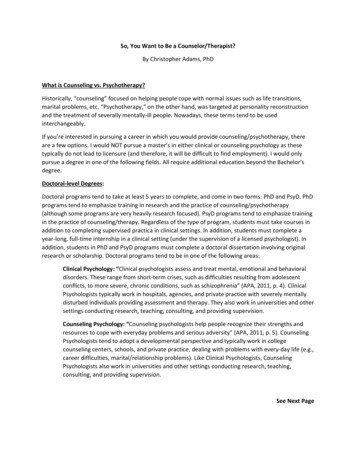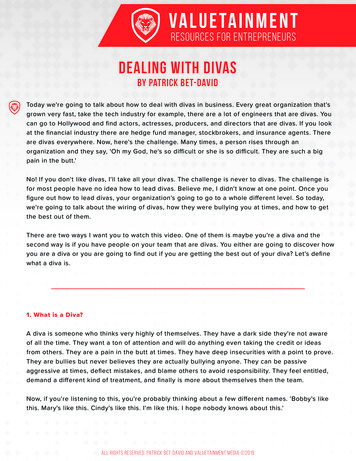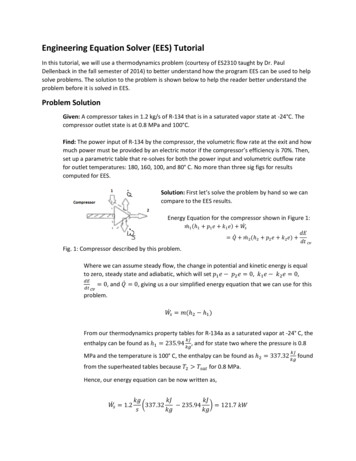
Transcription
So, You Want to Be a Counselor/Therapist?By Christopher Adams, PhDWhat is Counseling vs. Psychotherapy?Historically, “counseling” focused on helping people cope with normal issues such as life transitions,marital problems, etc. “Psychotherapy,” on the other hand, was targeted at personality reconstructionand the treatment of severally mentally-ill people. Nowadays, these terms tend to be usedinterchangeably.If you’re interested in pursuing a career in which you would provide counseling/psychotherapy, thereare a few options. I would NOT pursue a master’s in either clinical or counseling psychology as thesetypically do not lead to licensure (and therefore, it will be difficult to find employment). I would onlypursue a degree in one of the following fields. All require additional education beyond the Bachelor’sdegree.Doctoral-level Degrees:Doctoral programs tend to take at least 5 years to complete, and come in two forms: PhD and PsyD. PhDprograms tend to emphasize training in research and the practice of counseling/psychotherapy(although some programs are very heavily research focused). PsyD programs tend to emphasize trainingin the practice of counseling/therapy. Regardless of the type of program, students must take courses inaddition to completing supervised practica in clinical settings. In addition, students must complete ayear-long, full-time internship in a clinical setting (under the supervision of a licensed psychologist). Inaddition, students in PhD and PsyD programs must complete a doctoral dissertation involving originalresearch or scholarship. Doctoral programs tend to be in one of the following areas:Clinical Psychology: “Clinical psychologists assess and treat mental, emotional and behavioraldisorders. These range from short-term crises, such as difficulties resulting from adolescentconflicts, to more severe, chronic conditions, such as schizophrenia” (APA, 2011, p. 4). ClinicalPsychologists typically work in hospitals, agencies, and private practice with severely mentallydisturbed individuals providing assessment and therapy. They also work in universities and othersettings conducting research, teaching, consulting, and providing supervision.Counseling Psychology: “Counseling psychologists help people recognize their strengths andresources to cope with everyday problems and serious adversity” (APA, 2011, p. 5). CounselingPsychologists tend to adopt a developmental perspective and typically work in collegecounseling centers, schools, and private practice, dealing with problems with every-day life (e.g.,career difficulties, marital/relationship problems). Like Clinical Psychologists, CounselingPsychologists also work in universities and other settings conducting research, teaching,consulting, and providing supervision.See Next Page
The differences between Clinical and Counseling psychology are more historical and philosophical innature. Nowadays, there aren’t too many differences between the two areas as Clinical and CounselingPsychologists are trained comparably and end up working in similar settings and with similarpopulations/issues.Doctoral programs in Clinical and Counseling psychology are accredited by the American PsychologicalAssociation. A list of accredited programs may be found here: http://apps.apa.org/accredsearch/Master’s-Level Degrees:Master’s programs typically take 3 years to complete (if going full-time). You will take courses in topicssuch as: Counseling Theories & TechniquesAssessmentCase ManagementDiversityProfessional IdentityLegal & Ethical Issues Research MethodsPsychopathologySpecialty Courses (e.g., FamilyCounseling, Substance AbuseTreatment)In addition to coursework, you will complete practica providing counseling/therapy (under thesupervision of a licensed professional). Your final step in these programs will be to complete a full-timeinternship (typically, over the course of a full academic year).If you’re interested in master’s degrees, you should look for a master’s degree in Mental HealthCounseling, Clinical Social Work, or Marriage and Family Therapy – these all lead to licensure.(Clinical) Mental Health Counseling tends to focus a lot on doing counseling/psychotherapy.You can learn more here: ealth-counselors.htmMaster’s programs in MHC are accredited by an organization known as CACREP:http://www.cacrep.org/ and http://www.cacrep.org/for-students/Clinical Social Work allows you to do counseling/therapy, but also emphasizesprevention/outreach and case management. You can learn more service/social-workers.htmMaster’s programs are accredited by the Council on Social Work Education: https://cswe.org/See Next Page
Marriage & Family Therapy tends to focus a lot more on learning how to do counseling withcouples and families (although you will also learn how to individual counseling). You can learnmore about MFT here: ce/marriage-andfamily-therapists.htmThese programs are accredited by COAMFTE: gardless of the type of program, it is strongly suggested that you only consider accredited programs. Agrowing number of states require graduation from an accredited program for licensure and someemployers will only hire graduates of accredited programs. While many unaccredited programs arequite good, you run the risk of having a more difficult time obtaining licensure and finding employment.General Admissions Requirements:Generally, admissions committees are looking for very strong, well-rounded applicants. Mostimportantly, applicants to grad programs should have excellent undergraduate records (as indicated byyour GPA and transcripts). You may also have to take a standardized test (such as the GRE) and scorequite high on it (typically, well above the average or 50th percentile). In addition, graduate programs lookfor applicants with exceptional letters of recommendation and extracurricular activities (such asresearch experience, an internship, volunteering, and relevant work experience).Doctoral Programs: Admissions requirements vary depending on the type of doctoral program(that is, PhD vs. PsyD, research-oriented vs. clinically-focused program). Regardless, doctoralprograms tend to look for an overall GPA of at least 3.5 and a psychology GPA of 3.6 or higher.Typically, doctoral programs require standardized test scores and look for scores at least in the80th percentile. In addition, doctoral programs (even PsyD ones) tend to want applicants to haveresearch experience and other extracurricular activities on their resumes.Acceptance rates in doctoral programs ranger from 40-50% (for some less selective PsyDprograms) to 7% (for very competitive PhD) programs.Master’s Programs: Master’s programs tend to be less difficult to get into, although are stillhighly competitive. Master’s programs typically look for a minimum GPA of 3.0-3.2. While manymaster’s programs have moved away from requiring standardized test scores, several stillrequire these and tend to look for scores at least in the 50th percentile or higher. While master’sprograms may not look for research experience, they will look for involvement in variousactivities such as volunteering.See Next Page
Licensure:Upon graduation from a grad program, you generally must become licensed to practice independently.In order to become licensed, you typically need to pass licensure exams and complete at 1-2 years offull-time work under the supervision of a licensed professional.Getting Into Graduate Programs:While doctoral and master’s programs may look for some different things from their applicants, beloware some suggestions for increasing your odds of getting into graduate school: Treat school like a job. Take all of your undergraduate courses seriously – you want as high of aGPA as you can get. GPAs below 3.0 likely will not get you into grad school!Be intentional. Select undergraduate courses wisely and map out your education. If you’reinterested in a career as a therapist, consider taking courses that will best prepare you for gradschool. For example, be sure to take Psychology courses such as Abnormal Psychology,Personality, and Development. Also, consider taking courses in fields such as Human Services,Sociology, and Biology.Get to know your undergraduate professors. The better they know you, the easier time they’llhave writing strong letters of recommendation. Plus, they may know people in some of the gradprograms you’re interested in applying to.Get involved in research. Doing so will not only help you get into doctoral programs, it will alsolook impressive to master’s programs. Ask your professors if they are looking for researchassistants.Seek out extracurricular opportunities. Volunteer or look for relevant work experiences.Consider doing an internship. You can pursue an internship in a clinical setting providing somedirect services or in a research setting serving as a research assistant. Contact the program’sinternship coordinator for more information.Do your research. Not all grad programs are created the same. If, for example, you areinterested in doing research on or treating individuals suffering from PTSD, make sure youlocate programs that have faculty with such interests. Also, make sure you understand theadmissions requirements of the programs you’re interested in.Reach out. Consider contacting faculty at the programs you’re interested in. They often can helpyou better understand the programs and their admissions requirements. They may also bewilling to talk to you about their research interests.Don’t wait until the last minute. It is never too soon to begin investigating grad programs or talkto one of your professors about your interests (see next section).Expand your search. Unless you absolutely have to, don’t restrict your search for programs to asmall geographic area (such as Boston). You have much greater chance of getting accepted intoprograms in you look in a variety of areas, especially as programs often like to bring in studentsfrom outside their location. For example, instead of just looking in the Boston area, look in all ofNew England (or other areas you might be open to living in).See Next Page
Application Process: Starting Freshman year1. Research the various counseling-related fields.2. Talk to professors about your options and what they believe would be a good fit for you.3. Once you’ve narrowed down the field of study (for example, to mental healthcounseling), research graduate programs and their admissions requirements as soon asyou can, but no later than summer before senior year.Summer before Senior year1. Continue researching potential grad programs2. Contact potential programs with any questions you have3. Study for the GRE (or other required admissions tests)4. Take the GRE or other required tests the summer before senior yearFall of Senior year1. Take GRE again (if needed), but by no later than November2. Work on grad school applications (including personal statements)3. Obtain supporting materials for applications (including letters of recommendation,transcripts, work samples, etc)4. Have GRE (or other tests) scores sent to the schools you’re applying toWinter/Spring of Senior Year1. Send out/submit applications (Doctoral programs often have deadlines between DecFeb; Master’s programs often have deadlines between Feb-Mar)2. Follow up with programs to see if they’ve received your materials3. Prepare for phone and/or in-person interviews (if invited for one)4. Go on interviews (if required) – Dress in business attire!5. Hopefully receive acceptance letters!Other Related Fields:You may find some of the following fields interesting: PsychiatryPsychiatric NursingNeurologyRehabilitation CounselingSubstance Abuse/Addictions CounselingSocial PsychologyDevelopmental PsychologyIndustrial/Organizational PsychologySchool CounselingSchool and Educational PsychologyApplied Behavior AnalysisFor more information on these (and other related fields), go to: https://www.bls.gov/ooh/
SourcesAmerican Psychological Association. (2011). Careers in psychology. Retrieved s.pdfKramer, G. P., Bernstein, D. A., & Phares, V. (2014). Introduction to clinical psychology (8th ed.). Boston,MA: Pearson.Neukrug, E. (2014). A brief orientation to counseling: Professional identity, history, and standards.Belmont, CA: CengageNorcross, J. C., & Sayette, M. A. (2016). Insider’s guide to graduate programs in clinical and counselingpsychology (2016/2017 ed.). New York: Guilford Press.Sternberg, R. J. (Ed.). (2017). Career paths in psychology: Where your degree can take you (3rd ed.).Washington, DC: American Psychological Association.
The differences between Clinical and Counseling psychology are more historical and philosophical in nature. Nowadays, there aren't too many differences between the two areas as Clinical and Counseling . Norcross, J. ., & Sayette, M. A. (2016). Insider's guide to graduate programs in clinical and counseling psychology (2016/2017 ed.). New .











